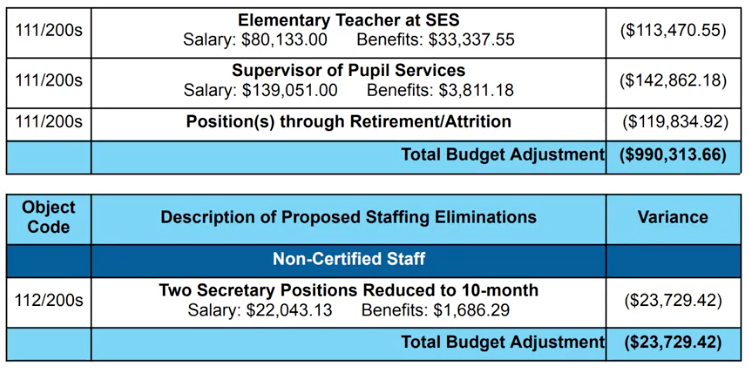The Impact of a 0% Budget Increase Becomes Clearer
- Theresa Cramer
- May 8, 2025
- 5 min read
After two failed referendums, the town’s various boards are scheduling multiple meetings a week to reach a budget proposal they think the voters will accept. This week, there’s already been one Board of Finance (BOF) meeting, overlapping Board of Selectmen (BOS) and Board of Education (BOE) meetings, and another BOF meeting on the schedule. At Monday night’s BOF meeting, it became clear that the next option was flat or level funding the budget. That means both sides will get no increase to their budgets. However, it doesn’t mean the mill rate won’t go up. As we reported earlier this week, while the grand list has increased, revenue has decreased due to a property tax exemption for disabled veterans and changes to how motor vehicle taxes are calculated, which is hitting towns hard. This means a .12 mill rate increase is necessary even if the budgets remain flat. Abramovich said that for the most expensive house in town, that would mean an increase of $39 per year.
So, what does that mean for the town and schools?
First Selectman Bill Morrison said at the BOS meeting, "No public safety will be impacted by the lines we cut.” Some savings were found through insurance quotes, and staff at the transfer station are taking single health plans instead of family plans. Selectman Rick Hartenstein did ask about cuts to the Special Revenue and Compensation Fund, wondering what cutting that line item would do to the town. CFO Yana Abramovich explained that after speaking with employees, especially those who might be nearing retirement, the town felt comfortable lowering this line item.
The selectmen did not get too deep into discussing the cuts, but as the last proposed budget had just a $46,786 (0.29%) increase over last year, there just weren’t that many cuts that needed to be made to get down to a 0% increase.
Meanwhile, across town at Stafford Elementary School, the BOE met to discuss what this would mean for its budget. Board member Shana Boland read a statement. Among others things, the statement read: “I have to say that with the most recent referendum, no one won. People are struggling to survive. Cost of living continues to rise. Teachers and staff members are completely burned out. Staff are wearing multiple hats, lacking the support needed, and feeling unsupported. Our community has valid questions. Some want to be able to understand more. And others feel they have the answers and that is of a hidden agenda.” She also called for the finger-pointing to stop among board members, even calling for an apology from her fellow board members for BOE Chair Sara Kelley and Interim Superintendent Dr. Laura Norbut. (Learn more about why she might feel that way here.)
After that statement, the board got into the 25-’26 budget. This started with a discussion of the solar credits. Stafford Public Schools’ Director of Finance Vicky DeSantis said that after a preliminary audit of the district's electric bills for ‘24-’25, the estimated cost would be $315,462.83 after deducting the solar credit and LED lighting loan payment. She estimated the solar credits at $251,470.72 for the year, far less than the $490,000 allocated for debt service. While the amount paid for the array is not likely tied directly to the amount of credit received, Kelley said she expects conversations about this to continue. So, expect to see this conversation surface again. Eventually, however, the board voted to move the $400,000 it had attempted to use for other line items back to debt service to pay for its part of the solar project.
Dr. Norbut presented the board with the reductions proposed to get the budget down to a 0% increase. She talked about working around fixed costs like legally mandated special education services, maintenance, HVAC inspections, and MOUs with the town that cannot be reduced. She said they tried to balance the reductions, impacting all unions and buildings so no one school or program was affected more than others. “I will say, the reductions at this point, they are not educationally responsible,” she added, before launching into the new budget.
Applying for new grant funds, $33,000 worth for West Stafford School, as well as an increase in the athletic fees to $150 for the high school and $100 at the middle school, helped increase revenue. Meanwhile, a $50,000 reduction in building maintenance helps get the job done for the moment, but if something breaks, who knows where that budget could wind up? Athletic equipment and the technology refresh are both being scaled back, while the unemployment budget line gets a significant increase, thanks to the cuts being made to staffing.
There will be significant reductions in staffing from interventionists to elementary school teachers. Dr. Norbut described creative staffing and scheduling to stretch the remaining budget dollars as much as possible. For instance, she stressed finding some way to continue providing some level of band instruction at the elementary level despite eliminating a full-time band teacher there.
One telling budget line item is open-ended savings through retirement and attrition. Dr. Norbut said that in addition to staff thinking about retiring, she expects staff to worry about the district’s stability and financial responsibilities to their families, ultimately leaving the district. She also stressed the impact these budgetary issues have on the district’s ability to attract and retain staff. “At this point, the leadership team feels that this is the option moving forward to allow us to be able to appropriately run our school buildings and educate our students in the best way possible in a really challenging circumstance,” she said.
Jennifer Biedrzycki pointed out that three-season athletes at the high school will now be paying $450 to play, nearly as much as signs around town erroneously claimed would be charged per family if the first budget referendum had passed. Additionally, she talked about a former Stafford teacher who is now in Somers, running the “Invention Convention,” which was previously held in Stafford.
Eileen Bartlett asked who would be left in the high school library if the library media specialist were eliminated. The answer is no one. The library media specialist was also running the French program, said Dr. Norbut, and the cuts will likely begin to impact accreditation. She said, “We’re trying to find the best pathway forward to have the least impact for kids. But again, I am certainly not going to say that this is something that I would want for the students of Stafford.”
NEASC accredits schools by looking at everything from the curriculum to the building itself. Stafford High School Principal Marco Pelliccia said that one of the questions he has to answer during accreditation is whether there is a full-time library media specialist, and soon, there may not be. Losing accreditation puts students at a disadvantage when applying to college, and many would likely choose to leave the district.
Aaron Hoffman said, “I share the concern over the athletic fee structure,” calling it a tax on student athletes. He said that participation is dropping and that he sees the inability to field competitive teams with his kids. Athletic Director Damian Frassinelli described several ways for families who can’t afford the fee to get assistance or waivers. In Tolland, Dr. Norbut said, the cost is $200 per student per sport.
The board had not yet voted on this budget version, waiting for the BOF to decide whether to pursue a 0% increase officially.











